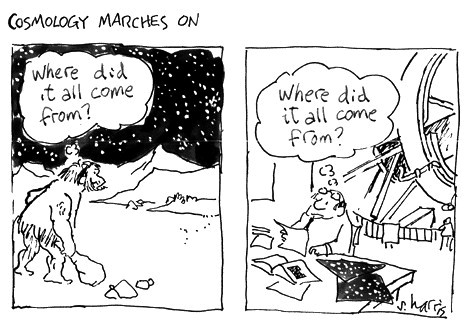Here’s an interview with Ed Feser, author of Five Proofs of the Existence of God: Feser’s presentation of the ‘Aristotelian’ proof is well done.
-
-
Notes: “Divine Necessity” by Robert Adams
Adams writes “to refute two…objections to the doctrine of divine necessity” (742). In doing so, he provides a refutation for evolutionary naturalism and an argument for the existence of God. Obj #1: The proposition, ‘God exists’, cannot be a necessary truth because only analytic truths can be necessary truths but existential propositions cannot be analytic truths. ‘God exists’ is an existential proposition. Therefore, ‘God exists’ cannot be a necessary truth. Why think analytic propositions cannot be existential propositions? An analytic proposition is a conditional the consequent of which is a correct analysis of the antecedent. For example, the proposition ‘if he is a bachelor, then he is unmarried’ (or ‘all…
-
Theism: Plain or Necessary?
Plain Theism is the view that ‘God exists’ is a logically contingent proposition. ‘God exists’ is neither necessarily true nor necessarily false. In contrast, necessitarian theism holds that the proposition, ‘God exists’ is necessarily true. In other words ‘it is false that God exists’ is a contradiction. I often wondered what would motivate my old prof, Keith Yandell to hold to plain theism. What does it mean to say that God does not have necessary existence or that ‘necessarily, God exists’ is necessarily false? Most theists contend that if ‘God exists’ is true, it is true necessarily. The answer, I think, lies in some of Dr. Yandell’s theistic argumentation. In…
-
God-of-the-Gaps: No Such Thing
Mathematician, Pierre-Simon LaPlace was once asked by the emperor of France where God was to feature in LaPlace’s mathematical system. LaPlace replied, “I have no need of that hypothesis.” The idea behind the quip is that if you can find a good explanations for something without God, then you don’t need him. And if you don’t need him, then this is good reason to suppose that he’s not there. The kind of God supposed in such thought is the “God-of-the-gaps” kind of God, a God who is necessary only in so far that he explains some feature of the world – existence, the movement of the planets, the habits of…
-
No Concept, No Belief
You couldn’t believe in something unless you knew something about it. If I said to you that a meroganon lives at the end of my street you might say I am nuts, but you would first want to know something about a meroganon. You couldn’t know if I am nuts unless you knew something about a meroganon. I could describe one to you by listing some of its basic features. After some time you would have in your mind the concept of a meroganon and you could then be justified in thinking that I have lost my mind. Consider the person (there may be more than one) who has not…
-
If There Is No God, Then There Is No Sense
When two people talk about something they assume there is something to talk about and that they have the necessary means (reason, language, shared experience etc) to talk about it. It does not strike us as odd that this is possible; we take it for granted. Friedrich Nietzsche, on the other hand, did not. Nietzsche famously describes a scene in which a madman proclaims the death of God. And if God is dead, says Nietzsche, we can no longer assume that what we are talking about makes any sense at all. Why? because if there is no ultimate explanation for everything, there is no explanation for anything. And if there is no explanation, talk cannot get anywhere.If…
-
Some Notes on Moreland’s “Consciousness and the Existence of God”
J.P Moreland argues that irreducible human consciousness provides compelling evidence for the existence of God. Moreland argues that naturalists ignore much of the background evidence for theism. Philosophical argument is favorable to theism, but these kinds of arguments are not forcing naturalists to raise the background probability of theism. Given the high probability of theism, the probability of consciousness being a mental property or substance is much higher (a theistic ontology admits mental substances/properties). On the other hand, given naturalism, the probability of mental properties is greatly diminished. To postulate mental properties on a physicalist ontology appears ad hoc and implausible. Moreland notes the most common objection to the argument…
-
Darwin’s Unconviction
Charles Darwin once said: “the impossibility of conceiving that this grand and wondrous universe, with our conscious selves, arose through chance, seems to me the chief argument for the existence of God; but whether this is an argument of real value, I have never been able to decide” (full transcript here). It strikes me that if such a clever fellow such as Darwin cannot decide if the most convincing argument for the existence of God is valid, then the rest of us mere average intellects have no chance. It points to a problem of proof and persuasion Just because there is a logically valid, sound argument for the existence of…
